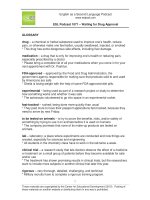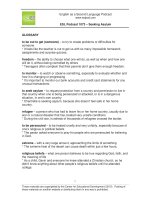ESL podcast 1073 – seeking asylum
Bạn đang xem bản rút gọn của tài liệu. Xem và tải ngay bản đầy đủ của tài liệu tại đây (98.89 KB, 10 trang )
English as a Second Language Podcast
www.eslpod.com
ESL Podcast 1073 – Seeking Asylum
GLOSSARY
to be out to get (someone) – to try to create problems or difficulties for
someone
* It feels like the teacher is out to get us with so many impossible homework
assignments and surprise quizzes.
freedom – the ability to choose what one will do, as well as when and how one
will do it, without being controlled by others
* Teenagers often complain that their parents don’t give them enough freedom.
to monitor – to watch or observe something, especially to evaluate whether and
how it is changing or progressing
* It’s important to monitor our bank accounts and credit card statements for any
unusual transactions.
to seek asylum – to request protection from a country and permission to live in
that country when one is being persecuted or attacked, or is in a dangerous
situation, in one’s own country
* Chantrelle is seeking asylum, because she doesn’t feel safe in her home
country.
refugee – a person who has had to leave his or her home country, usually due to
war or a natural disaster that has created very unsafe conditions
* During the civil war, hundreds of thousands of refugees crossed the border.
to be persecuted – to be treated cruelly and very unfairly, especially because of
one’s religious or political beliefs
* The pastor asked everyone to pray for people who are persecuted for believing
in God.
extreme – with a very large amount, approaching the limits of something
* The extreme heat of the desert can cause death within just a few hours,
religious beliefs – what one person believes to be true regarding God, faith, and
the meaning of life
* As a child, Gavin and everyone he knew attended a Christian church, so he
didn’t know anything about other people’s religious beliefs until he attended
college.
1
These materials are copyrighted by the Center for Educational Development (2015). Posting of
these materials on another website or distributing them in any way is prohibited.
English as a Second Language Podcast
www.eslpod.com
ESL Podcast 1073 – Seeking Asylum
to emigrate – to permanently leave one’s country in order to live in a new
country
* Have you thought about emigrating to join your children overseas?
to urge – to strongly encourage someone to do something; to pressure or try to
persuade someone to do something
* We urge our lawmakers to pass this bill to provide more funding for schools.
resettlement – the process of helping a large number of people move to a new
place or country and restart their lives there
* The resettlement of Native Americans in the 19th century had a huge impact on
their culture, economy, and health.
quota – the number of people or things that one must do, have, or process; the
minimum or maximum amount of something that one must do or have
* How many of our employees met their sales quota last month?
to renounce (one’s) citizenship – to officially state that one no longer wants to
be a citizen of a particular country
* Do you have to renounce your U.S. citizenship if you want to become a citizen
of another country?
to let off steam – to vent; to do or say something to express one’s frustration or
irritation, especially saying things that one doesn’t really mean; to release one’s
negative emotions
* Running is a good way to let off steam after a long, stressful week at the office.
follow-through – the continuation of an action or fulfillment of a process until the
very end, when it is finished
* Before selecting contractors, talk to their former clients to assess their followthrough. You don’t want to end up with a half-finished project.
the courage of (one’s) convictions – confidence and certainty to do what one
believes is right, even though it is difficult or frightening
* Jane shows the courage of her convictions by buying only from small grocery
stores to support small business owners, rather than large chain stores.
to man up – to be very brave, courageous, and tough in a difficult situation or
while completing a difficult or frightening task
* It’s just a spider! Man up and kill it, or at least put it outside.
2
These materials are copyrighted by the Center for Educational Development (2015). Posting of
these materials on another website or distributing them in any way is prohibited.
English as a Second Language Podcast
www.eslpod.com
ESL Podcast 1073 – Seeking Asylum
COMPREHENSION QUESTIONS
1.
a)
b)
c)
What does Julie mean when she says, “The government is out to get me”?
The government is taxing her too heavily.
The government has very slow service.
The government is spying on her.
2.
a)
b)
c)
What does “letting off steam” mean?
Getting rid of negative emotions.
Becoming very angry.
Feeling very hot.
______________
WHAT ELSE DOES IT MEAN?
urge
The verb “to urge,” in this podcast, means to strongly encourage someone to do
something, or to pressure or try to persuade someone to do something: “The
company is urging consumers to return defective products for a full refund.” Or,
“The President is urging quick action to lower pollution levels.” The verb “to urge”
can also means to push someone to make that person move: “Why are you
urging me out the door? Can’t I finish my coffee first?” The phrase “to urge
(someone) on” means to provide encouragement for someone to continue doing
something that is difficult: “The runners were exhausted, but the cheering crowd
urged them on.” Finally, an “urge” is a strong desire to do or have something:
“The pregnant woman felt an urge to eat pickles and peanut butter.”
follow-through
In this podcast, the phrase “follow-through” means the continuation of an action
or fulfillment of a process until the very end, when it is finished: “He made a lot of
promises, but his follow-through was weak.” The phrase “follow-up” refers to
what one does to make sure that something has happened or that something has
worked as intended: “Who’s responsible for follow-up with the candidates who
were interviewed last week?” A “follow-up” can also be the next item in a series:
“Do you think Hollywood will make a follow-up movie?” Finally, the phrase “to
follow from” means to be a result of something, or to be true because of
something: “Therefore, it follows from our research that medical professionals
need to be more careful handling hazardous materials.”
3
These materials are copyrighted by the Center for Educational Development (2015). Posting of
these materials on another website or distributing them in any way is prohibited.
English as a Second Language Podcast
www.eslpod.com
ESL Podcast 1073 – Seeking Asylum
CULTURE NOTE
Extradition Treaties
“Extradition” is the process of one country transferring a “criminal” (a person who
has committed a crime and broken the law) or “suspected criminal” (a person
who is believed to be a criminal, but it hasn’t yet been proven) to another country,
usually the country where the crime was committed. For example, if a man
commits a murder in the United States and then “flees” (runs away) to a country
in Europe, the United States might “initiate” (begin) extradition proceedings,
asking the European country to transfer that man back to the United States,
where he will “be subject to” (have to follow the rules of) the country’s “judicial
system” (the people and agencies involved in determining whether people have
broken the law and what their punishment should be).
“Sovereignty” (the power and the authority of a state or nation to govern itself)
includes the idea that a government has people within its “borders” (on its land),
so a country “is not obligated” (does not have to) extradite a criminal or
suspected criminal to another country. That is why the “terms” (specific
requirements and characteristics) of extradition are usually “governed” (ruled,
controlled) by “treaties” (official agreements between countries) in which
countries agree to extradite individuals under certain conditions.
Normally, extradition treaties “stipulate” (clearly state) that a country will
participate in extradition proceedings only if the crime is punishable in both
countries. Many countries refuse to extradite individuals “accused of” (said to
have done something bad) political crimes. And others refuse to extradite
individuals if they might be subject to “torture” (using physical pain to punish
someone) or the “death penalty” (killing someone as punishment for a crime).
______________
Comprehension Questions Correct Answers: 1 – c; 2 – a
4
These materials are copyrighted by the Center for Educational Development (2015). Posting of
these materials on another website or distributing them in any way is prohibited.
English as a Second Language Podcast
www.eslpod.com
ESL Podcast 1073 – Seeking Asylum
COMPLETE TRANSCRIPT
Welcome to English as a Second Language Podcast number 1,073 – Seeking
Asylum.
This is English as a Second Language Podcast episode 1,073. I’m your host, Dr.
Jeff McQuillan, coming to you from the Center for Educational Development in
beautiful Los Angeles, California.
Our website is ESLPod.com. Go there and take a look at our ESL Podcast Store.
It has some courses in Business and Daily English. All of our courses can be
downloaded immediately. Go to ESLPod.com and check them out.
This episode is a dialogue between Julie and Ed about people who need to leave
their home country and go to a different country because they’re not safe where
they’re living now. Let’s get started.
[start of dialogue]
Julie: The government is out to get me. I feel like I don’t have any real freedom
and everything I do is being monitored.
Ed: Maybe you should move to another country.
Julie: I guess that’s one solution.
Ed: Yes, you should seek asylum in another country.
Julie: Become a refugee? I’m not sure I want to do that.
Ed: Well, if you feel like you’re being persecuted, you should look for other
options.
Julie: That seems a little extreme.
Ed: People who are being treated unfairly because of their political opinions or
religious beliefs have the option to emigrate.
Julie: I’m not sure I’d go that far.
5
These materials are copyrighted by the Center for Educational Development (2015). Posting of
these materials on another website or distributing them in any way is prohibited.
English as a Second Language Podcast
www.eslpod.com
ESL Podcast 1073 – Seeking Asylum
Ed: I urge you to think about it. Other countries have resettlement programs for
refugees, and not every country will have reached their quota yet this year. You
might still find a country that will take you.
Julie: I didn’t say that I wanted to renounce my citizenship. I was just letting off
steam.
Ed: That’s the problem with you young people these days. You have no followthrough and no courage of your convictions. You all need to man up!
[end of dialogue]
Julie begins our dialogue by saying to Ed, “The government is out to get me.”
When you say someone or some organization is “out to get” you, you mean that
the person is trying to create problems or difficulties for you. If someone says,
“My teacher is out to get me,” he means that the teacher doesn’t like him and is
trying to do something bad to him. Usually when that happens, it’s the student’s
fault, of course. As a teacher, I have to say that.
Julie says, “I feel like I don’t have any real freedom and everything I do is being
monitored.” “Freedom” is the ability to choose what you want to do and do it
when you want to do it. We can talk about freedom as it relates to political
expression, of giving your opinion. We could talk about “religious freedom” – the
ability to practice the religion that you want. All of these are kinds of freedoms.
Julie says she doesn’t feel like she has any real freedom and that everything she
does “is being monitored.” “To monitor” means to watch or observe something,
especially if you are trying to see whether that thing is changing. Here, we think
Julie is referring to the government watching her actions and making sure she
doesn’t do anything the government doesn’t like. Ed says, “Maybe you should
move to another country.” Julie says, “I guess that’s one solution” – that’s one
answer to this problem.
Ed says, “Yes, you should seek asylum in another country.” “To seek asylum”
(asylum) means to go to another country, or to the officials of another country,
and ask for permission to live in that country. Usually people seek asylum when
they don’t feel safe in the country where they are living now, perhaps because
the government is persecuting them. “To persecute” (persecute) someone is to
treat someone unfairly, often because of their political or religious beliefs. When
that happens, people sometimes seek asylum. They try to go to a different
country.
6
These materials are copyrighted by the Center for Educational Development (2015). Posting of
these materials on another website or distributing them in any way is prohibited.
English as a Second Language Podcast
www.eslpod.com
ESL Podcast 1073 – Seeking Asylum
Julie says to Ed, “Become a refugee?” She means, “Do you mean I should
become a refugee?” A “refugee” (refugee) is a person who has to leave his or her
home country, often because there is a war or there’s some situation making it
unsafe for the person to live there. You could have political refugees. You could
have refugees for other reasons as well. Perhaps there was a natural disaster or
something bad has happened in a country. People leave that country to try to go
to another country. We call those people “refugees.”
Julie says, “I’m not sure what I want to do.” Ed says, “Well, if you feel like you’re
being persecuted, you should look for other options.” Julie says, “That seems a
little extreme.” When we describe something as being “extreme” (extreme), we
mean that it is too much of something, that it’s a very large amount of something.
In this case, it means perhaps that the solution that Ed is proposing is too
“drastic,” we could say. It goes too far. Maybe she can do something that doesn’t
require her to actually leave the country and go to another country.
Ed continues, “People who are being treated unfairly because of their political
opinions or religious beliefs have the option to emigrate.” The term “religious
beliefs” refers to the kind of religion that you practice. In some countries it can be
very dangerous not to be of the religion of the majority, and that would be a case
where you might be persecuted for your religious beliefs.
Ed says that people who are being treated unfairly “have the option to emigrate.”
“To emigrate” (emigrate) means to leave one country to go to another country.
Now, we have another word that sounds quite similar, which is “immigrate”
(immigrate). Really, the two words mean the same thing, or refer to the same
action. They just emphasize a different aspect of that action. If you “emigrate”
from one country, you “immigrate” to another country.
So, someone could say, “I immigrated to the United States.” That means that
person came here. However, the same person could say, “I emigrated from
Ireland” (or from Japan, or from Columbia). “To emigrate” puts the emphasis on
leaving the country where you’re living now. “To immigrate” puts the emphasis on
coming to the country where you have arrived. Julie says, “I’m not sure I’d go that
far.” She’s not sure if she wants to actually leave the country.
Ed, however, says, “I urge you to think about it.” “To urge” (urge) someone
means to encourage someone, to tell that person that you strongly believe that
he or she should do this certain thing, this action. Ed says, “Other countries have
resettlement programs for refugees.” “Resettlement” refers to the process of
helping people come to a new country and adapt to the life there. We usually use
this term when we’re talking about a large group of people, typically political or
7
These materials are copyrighted by the Center for Educational Development (2015). Posting of
these materials on another website or distributing them in any way is prohibited.
English as a Second Language Podcast
www.eslpod.com
ESL Podcast 1073 – Seeking Asylum
religious refugees who are leaving their home country and coming as a group to
another country.
When I was growing up, for example, in the 1970s, there were a lot of refugees
from Vietnam. Those refugees participated in a resettlement program where the
U.S. government helped them to come to the United States and find housing for
them and find them jobs and so forth. “Resettlement programs” are usually run
by the government, although sometimes private organizations participate in that
as well.
Ed says that “not every country will have reached their quota yet this year.” A
“quota” (quota) is usually the maximum or the minimum number of people that
you can have – or it could be for a certain number of anything, really, that you
can have. For example, if you are a salesperson – you work selling things to
other companies – your company may give you a quota. They may say, “You
have to sell a thousand dollars every week of our product or service.” That
thousand dollars is your quota.
If you sell a thousand dollars, then we would say you have “met” (met) your
quota. The verb would be “to meet” a quota. “Quota” here refers not to money,
but to people. Many countries, including the United States, have a limit to the
number of people they will accept as immigrants each year. That number is the
quota – in this case, the maximum number of people that they will accept. Ed is
saying that some countries have not yet reached their quota this year –
presumably, their quota for refugees. “You might still find a country that will take
you” – that will accept you.
Julie says, “I didn’t say I wanted to renounce my citizenship. I was just letting off
steam.” “To renounce (renounce) your citizenship” is to say that you no longer
want to be considered part of a certain country. If you renounce your American
citizenship, you’re saying, “I no longer want to be an American. I don’t want to be
legally considered an American.” Usually that means that you no longer have an
American passport. In fact, in all cases I think it would mean that.
Julie says, however, that she does not want to renounce her citizenship. She was
just “letting off steam” (steam). The expression “to let off steam” means to say
something or to do something that expresses your frustration, your anger, your
irritation, but it is not meant to be taken too seriously. Someone who is letting off
steam is someone who is perhaps yelling, shouting, or saying things about
another person – complaining about something as a way of getting those
emotions out, to release those negative feelings that they have.
8
These materials are copyrighted by the Center for Educational Development (2015). Posting of
these materials on another website or distributing them in any way is prohibited.
English as a Second Language Podcast
www.eslpod.com
ESL Podcast 1073 – Seeking Asylum
It’s a psychological thing. You don’t really want to do some of the things perhaps
even that you say when you are letting off steam. Ed, however, says, “That’s the
problem with you young people these days. You have no follow-through and no
courage of your convictions. You all need to man up!” From the dialogue, we’re
guessing that Ed is older than Julie – perhaps quite a bit older – because she
refers to her as being a member of a group that he considers “young people.”
He says that “young people today have no follow-through.” “Follow-through”
refers to completing or finishing the actions that you’ve started. “Follow-through”
means getting something done, completing something – not stopping halfway
through, not quitting before you’ve finished. The expression “courage of your
convictions” refers to a confidence and perhaps the certainty that what you are
doing is right. Your “convictions” are your beliefs. “To have the courage of your
convictions” means to really believe what you say and therefore be willing to act
on those beliefs, those convictions.
That’s why Ed ends our dialogue by saying, “You all” – meaning you young
people, including Julie – “need to man up.” “To man up” is a somewhat recent
phrasal verb that has become popular. It means to be brave, to be courageous.
Usually it’s addressed to men. If you say to a man, “You should man up,” you’re
saying that the man should take responsibility, to do what a man would do – to
be strong, to be courageous.
Here, however, Ed is addressing it to a whole group of people, which is a little
unusual, but we understand what he’s saying here. He’s saying that Julia and the
other people who have similar convictions should follow through. They should do
what they say they want to do.
Now let’s listen to the dialogue, this time at a normal speed.
[start of dialogue]
Julie: The government is out to get me. I feel like I don’t have any real freedom
and everything I do is being monitored.
Ed: Maybe you should move to another country.
Julie: I guess that’s one solution.
Ed: Yes, you should seek asylum in another country.
Julie: Become a refugee? I’m not sure I want to do that.
9
These materials are copyrighted by the Center for Educational Development (2015). Posting of
these materials on another website or distributing them in any way is prohibited.
English as a Second Language Podcast
www.eslpod.com
ESL Podcast 1073 – Seeking Asylum
Ed: Well, if you feel like you’re being persecuted, you should look for other
options.
Julie: That seems a little extreme.
Ed: People who are being treated unfairly because of their political opinions or
religious beliefs have the option to emigrate.
Julie: I’m not sure I’d go that far.
Ed: I urge you to think about it. Other countries have resettlement programs for
refugees, and not every country will have reached their quota yet this year. You
might still find a country that will take you.
Julie: I didn’t say that I wanted to renounce my citizenship. I was just letting off
steam.
Ed: That’s the problem with you young people these days. You have no followthrough and no courage of your convictions. You all need to man up!
[end of dialogue]
Our scriptwriter always finishes what she starts. She has great follow-through. I
speak, of course, of the wonderful Dr. Lucy Tse. Thank you, Lucy.
From Los Angeles, California, I’m Jeff McQuillan. Thank you for listening. Come
back and listen to listen to us again right here on ESL Podcast.
English as a Second Language Podcast was written and produced by Dr. Lucy
Tse, hosted by Dr. Jeff McQuillan. Copyright 2015 by the Center for Educational
Development.
10
These materials are copyrighted by the Center for Educational Development (2015). Posting of
these materials on another website or distributing them in any way is prohibited.









